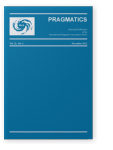Performing bilingualism in Wales
Arguing the case for empirical and theoretical eclecticism
This article examines Welsh young people’s “performance” and construction of their bilingualism with the help of empirically grounded conversation analysis (CA) and performativity theory grounded in poststructuralism. Some of the incompatibilities, particularly conversation analysts’ narrow conception of context are resolved with reference to dialogical theory. It is argued with the help of video-recorded empirical data that a fine-grained analysis using CA is able to trace the emergence of varying bilingual identities as well as the negotiation of meaning in situ. To take the analysis beyond single situated actions, however, it is argued that we need recourse to the broader situation-transcending constructs offered, for example, by dialogical and performativity theory.
References (37)
Académie française
(
1635)
Statuts et règlements.
[URL]
Althusser, L.
(
1971)
Ideology and ideological state apparatuses (trans. by
B. Brewster). In
L. Althusser (ed.),
Lenin and Philosophy and Other Essays. New York/London: Monthly Review Press, pp. 127–186.

Auer, J.C.P.
(
1999)
From codeswitching via language mixing to fused lects: Toward a dynamic typology of bilingual speech.
International Journal of Bilingualism 3.4: 309–332.


Austin, J.L.
(
1962)
How to do things with words. Cambridge, MA: Harvard University Press.

Bakhtin, M.
(
1981)
The dialogic imagination: Four essays (trans. by
M. Holquist &
C. Emerson). Austin: University of Texas Press.

Butler, J.
(
1990a)
Gender trouble: Feminism and the subversion of identity. New York/London: Routledge.

Butler, J.
(
1990b)
Performative acts and gender constitution: An essay in phenomenology and feminist theory. In
S.-E. Case (ed.),
Performing feminisms: Feminist critical theory and theater. Baltimore: John Hopkins University Press, pp. 270–282.

Butler, J.
(
1993)
Bodies that matter: On the discursive limits of ‘sex’. New York/London: Routledge.

Butler, J.
(
1997)
Excitable speech: A politics of the performative. New York/London: Routledge.

Ceredigion County Council [CCC]
(
2001)
Welsh education scheme: A language scheme for education prepared in accordance with the requirements of the Welsh Language Act 1993. Aberystwyth.

Derrida, J.
(
1977)
Signature event context (trans. by
S. Weber &
J. Mehlman). In
G. Graff (ed.),
Limited Inc. Evanston, IL: Northwestern University Press, pp. 1–23.

Ferguson, C.A.
(
2000 [1959])
Diglossia. In
L. Wei (ed.),
The Bilingualism Reader. London: Routledge, pp. 65–80.

Foucault, M.
(
1990)
The Use of Pleasure: The History of Sexuality Volume 2 (trans. by
R. Hurley). New York: Vintage Books.

Garfinkel, H.
(
1967)
Studies in ethnomethodology. Englewood Cliffs, NJ: Prentice Hall.
BoP
Grixti, J.
(
2008)
‘Glocalised’ youth culture as linguistic performance: Media globalisation and the construction of hybrid identities.
Noves SL. Revista de Sociolingüística Winter 2008.
[URL]
Heritage, J.
(
2008)
Conversation analysis as social theory. In
B. Turner (ed.),
The new Blackwell companion to social theory. Oxford, UK: Blackwell, pp. 300–320.

Hutchby, I., and R. Wooffitt
(
1998)
Conversation analysis: Principles, practices and applications. Oxford: Polity Press.
BoP
Jørgensen, J.N., and A. Holmen
(
1997)
The integrated bilingualism approach: Introduction. In
J.N. Jørgensen, and
A. Holmen (eds.),
The Development of Successive Bilingualism in School-Age Children. Copenhagen Studies in Bilingualism 27. Copenhagen: Royal Danish School of Educational Studies, pp. 7–14.

Linell, P.
(
2005)
The language bias in linguistics: Its nature, origin and transformations. Oxford: Routledge.


Linell, P.
(
2009)
Rethinking language, mind, and world dialogically: Interactional and contextual theories of human sense-making. Charlotte, NC: Information Age Publishing, Inc.

Milani, T.M.
(
2006)
Language planning and national identity in Sweden: A performativity approach. In
C. Mar-Molinero, and
P. Stevenson (eds.),
Language ideologies, policies and practices: Language and the future of Europe. Basingstoke, UK: Palgrave Macmillan, pp. 104–117.


Milani, T.M.
(
2005)
Om performativitet: Ett postmodernistiskt angreppssätt på språkpolitik och språkplanering. In
B. De Geer, and
A. Malmbjer (eds.),
Språk på tvärs. Rapport från ASLA:s höstsymposium 2004. Uppsala: ASLA, Svenska föreningen för tillämpad språkvetenskap, pp. 23–38.

Musk, N.
(
2006)
Performing bilingualism in Wales with the spotlight on Welsh. Linköping: LiU-Tryck.
[URL]
Norrby, C.
(
1996)
Samtalsanalys: Så gör vi när vi pratar med varandra. Lund: Studentlitteratur.

Pennycook, A.
(
2001)
Critical applied linguistics: A critical introduction. New Jersey, USA: Lawrence Erlbaum Associates, Inc.
BoP.


Pennycook, A.
(
2003)
Global Englishes, rip slyme, and performativity.
Journal of Sociolinguistics 7.4: 513–533.
 BoP
BoP
Pomerantz, A.
(
1986)
Extreme case formulations.
Human Studies 91: 219–230.


Rommetveit, R.
(
1984)
The role of language in the creation and transmission of social representations. In
R.M. Farr, and
S. Moscovici (eds.),
Social representations. Cambridge: Cambridge University Press, pp. 331–359.

Sacks, H., E. Schegloff, and G. Jefferson
(
1974)
A simplest semantics for the organization of turn taking in conversation.
Language 501: 697–735.


Sarkar, M., and L. Winer
(
2006)
Multilingual codeswitching in Quebec rap: Poetry, pragmatics and performativity.
The International Journal of Multilingualism 3.3: 173–192.
 BoP
BoP
Schegloff, E., G. Jefferson, and H. Sacks
(
1977)
The preference for self-correction in the organization of repair in conversation.
Language 531: 361–82.
 BoP
BoP
Seedhouse, P.
(
2004)
The interactional architecture of the language classroom: A conversation analysis perspective. Oxford: Blackwell.

Speer, S.A., and J. Potter
Stroud, C.
(
2004)
The performativity of codeswitching.
International Journal of Bilingualism 8.2: 145–166.
 BoP
BoP
Welsh Assembly Government [WAG]
(
2003)
Iaith Pawb: A national action plan for a bilingual Wales.
[URL]
Cited by (1)
Cited by 1 other publications
Chen, I-Hsuan, Yunfei Long, Qin Lu & Chu-Ren Huang
2021.
Orthographic features for emotion classification in Chinese in informal short texts.
Language Resources and Evaluation 55:2
► pp. 329 ff.

This list is based on CrossRef data as of 15 july 2024. Please note that it may not be complete. Sources presented here have been supplied by the respective publishers.
Any errors therein should be reported to them.
